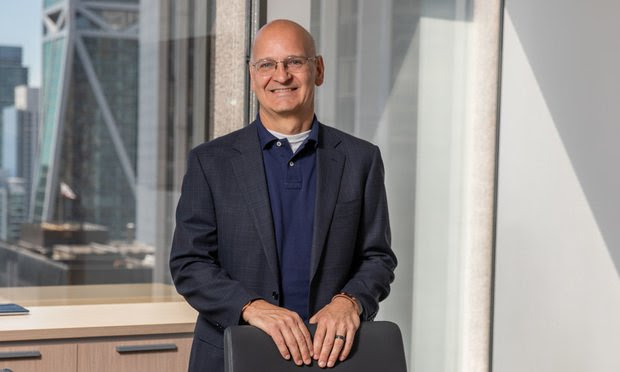Skilled in the Art: Dot-Com Amicus Boom Ahead of SCOTUS Argument + No Need to Delay Amazon Fee Motion + Desmarais Bridges the Silicon Valley Divide
An army of generic dot-coms are going to bat for Booking.com in an upcoming Supreme Court case.
April 17, 2020 at 07:30 PM
11 minute read
Welcome to Skilled in the Art. I'm Law.com IP reporter Scott Graham. Here's what's on my plate today:
• An army of generic dot-coms are going to bat for Booking.com in upcoming Supreme Court case.
• Amazon's $6.1 million attorney fee motion is going forward in San Jose, COVID-19 or not.
• Desmarais is bridging one of Silicon Valley's great divides.
As always, you can email me your feedback and follow me on Twitter.
 Williams & Connolly partner Lisa Blatt (Photo: Diego Radzinschi/ALM)
Williams & Connolly partner Lisa Blatt (Photo: Diego Radzinschi/ALM)
The Supreme Court is back in business on May 4 and guess what it's leading off with? An IP case!
USPTO v. Booking.com is slated to go down in history as the court's first ever live-audio virtual hearing. Nothing's official yet, but it seems likely that Williams & Connolly partner Lisa Blatt, who's counsel of record for Booking.com B.V., will have the honor of arguing against Deputy Solicitor General Malcolm Stewart, who argued for the PTO in Matal v. Tam, Iancu v. Brunetti and Peter v. NantKwest.
Williams & Connolly will bear the weight not only of Booking.com, but a virtual army of businesses who've either registered or want to register a generic name combined with dot.com. The PTO argues that such names are per se generic. Salesforce.com is headlining one amicus curiae brief, while Cars.com LLC, Dictionary.com LLC, and Wine.com LLC are among 15 others that have banded together as amicus Coalition of .Com Brand Owners.
"Under the USPTO's proposed rule, none of these businesses could obtain a trademark registration for their brands," the coalition warns in a brief signed by Thad Chaloemtiarana of Pattishall, McAuliffe, Newbury, Hilliard & Geraldson. "Foreclosing any possibility of registration would make it more difficult for these businesses to stop consumer confusion in the marketplace, notwithstanding the fact that these businesses encounter the same types of infringements and counterfeiting that other brand owners encounter."
To recap, the longstanding rule is that generic names can't be trademarked. If you sell apples you cannot register the name "Apples" with the PTO because it would give you a monopoly on the name of the product. (A computer company can register Apple, because "arbitrary marks" don't pose the same threat.)
The PTO argues that adding .com isn't enough to elevate a generic mark to descriptiveness. It's invoking an 1888 Supreme Court ruling that adopted a similar rule for the addition of "Company" or "Inc." to a name. "Parties united to produce or sell wine, or to raise cotton or grain, might style themselves Wine Company, Cotton Company, or Grain Company; but by such description they would in no respect impair the equal right of others engaged in similar business to use similar designations," Justice Stephen Field wrote in that case, Goodyear's India Rubber Glove Mfg. Co. v. Goodyear Rubber Co.
"The same rationale applies to top-level domains like '.com,'" the PTO argues in briefs to the court, "which indicate only that an entity has an online presence."
More recently, the Federal Circuit has upheld the PTO's refusal to register Hotels.com and Mattress.com, and the Ninth Circuit has found AOL's Advertising.com generic.
The agency is getting amicus support from the Electronic Frontier Foundation and a group of IP scholars led by Harvard's Rebecca Tushnet, who are cautioning against giving generic mark holders too big of a stick to ward off competitors. "For example, [Booking.com] might seek to exclude its competitors from using booking.biz, booking.co, booking.inc, or booking.company as a domain name," writes EFF staff attorney Alex Moss.
Booking.com, which won a split decision at the Fourth Circuit, argues that a lot has changed in the 130 years since Goodyear's was decided. The Lanham Act "repudiated" the decision, the company says. Today the question is whether consumers identify a mark with a single brand. And Booking.com submitted a consumer survey that showed 74% identified it as a brand, compared to only 30% who (incorrectly) identified Washingmachine.com as a brand.
Blatt and her colleagues argue that the PTO doesn't even follow its own test. "The national grocery chain FOODS CO is indeed a company selling foods, just as THE WIG COMPANY is a company selling wigs and THE FLAGPOLE COMPANY is a company selling flagpoles," Blatt writes. "Seeking a date? Try DATING.COM. Want to impress with concert tickets? TICKETS.COM or CONCERT.COM can get them. Hoping for nice weather? Check WEATHER.COM."
All of those names are registered on the PTO's principal or supplemental register, which means they're not generic, Booking.com argues. Even after the government petitioned for certiorari last summer, the PTO registered Rentals.com, Concert.com and Roommates.com, argues Blatt, who's joined on the brief by other attorneys from W&C along with Debevoise & Plimpton and Foley & Lardner.
Amici Salesforce.com, The Home Depot and BA Sports Nutrition are offering support. The government is "elevating the convenience of bright-line rules above statutory text and structure, judicial precedent, the interests of consumers, and the realities of the marketplace," they argue in a brief signed by Gibson, Dunn & Crutcher partner Thomas Hungar.
The American Intellectual Property Law Association argues that without trademark protection, a Booking.com competitor could theoretically open up a storefront called "Booking.com" and deceive consumers into believing that it's associated with the online service.
Amicus Internet Commerce Association adds that to fight domain name typo-squatting, the owner of a legitimate domain name has to show ICANN that its name is trademarked.
The PTO counters that the Lanham Act makes no mention of overruling Goodyear's, and that unfair competition law provides plenty of protection against typo-squatting or other efforts to mislead consumers.
The agency gets a half-million trademark-registration applications annually and, yes, some are erroneously registered, the PTO concedes. But those errors don't bind the agency to wrongly register similar marks in the future, the agency argues. And it has rejected names such as Creditcards.com, Drugstore.com, Petstore.com, Rentalcars.com, Sportsbetting.com and Vacationrentals.com as too generic, the PTO notes in a lengthy appendix to its reply brief.
My two cents: The Supreme Court doesn't need much reason to throw aside its precedents these days, so the PTO may regret putting all its eggs in the Goodyear's basket.
 Judge Beth Labson Freeman. (Photo: S. Todd Rogers/ALM)
Judge Beth Labson Freeman. (Photo: S. Todd Rogers/ALM)
As is her custom, U.S. District Judge Beth Labson Freeman of the Northern District of California was cordially decisive Thursday.
She turned down NPE PersonalWeb Technologies' bid to put on hold Amazon.com's motion for $6.1 million in attorneys fees. As I wrote on Tuesday, PersonalWeb had argued that similarities with its substantive appeal to the Federal Circuit—plus the stress on courts caused by coronavirus—counseled in favor of delay.
Personal Web's attorney, Stubbs Alderton & Markiles partner Michael Sherman, didn't bring up the pandemic during Thursday's brief telephonic hearing, instead emphasizing what he called the "scant authority" for proceeding on a fee motion when issues like claim construction are pending appeal. Even if the Federal Circuit affirms, it might describe the issue as a close call, which would militate against fees, Sherman said.
But there's no absence of authority in Freeman's court. "I actually can't remember a case where I didn't" proceed on a fee motion while the case was still fresh, the judge said. "If you win on appeal, then the Federal Circuit will shred anything I write on attorneys fees, and that's just the way it will go," Freeman said.
She volunteered to give Sherman a few extra weeks to respond to Amazon if needed. But other than jury trials that have been put on hold, there's no slowdown in the Robert Peckham Courthouse. "It seems like business is booming in the federal district courts here," Freeman said.
Fenwick & West partner Dave Hadden represented Amazon.

Trade Secrets and the Federal Courts
Are trade secrets gaining on patents as the IP litigation of choice? Here's one data point, courtesy of Lex Machina: The number of federal cases where damages were awarded for trade secrets dropped last year, from 19 to 15. But the total damages awarded jumped from $72 million to $105 million.
Lex Machina's Carla Rydholm and Rachel Bailey are going to be joined by Crowell & Moring partner Mark Klapow for a closer look at Defend Trade Secrets Act filings, injunctions and top law firms in a free webcast on Tuesday. Registration can be found here.
 John Desmarais (Photo: Jason Doiy/ALM)
John Desmarais (Photo: Jason Doiy/ALM)
Who Got the Work?
A couple of quick hits, courtesy of ALM's Legal Radar:
➤ Kewazinga v. Google. Five years ago, my former ALM colleague Patience Haggin wrote about the "great divide" between law firms that represent Apple and Google. You can now add Desmarais to the ranks that have bridged the divide. The patent litigation boutique touted Apple as one of its reasons for opening in San Francisco last year. Now Google is a client too. Desmarais filed a DJ action for the search giant last fall, and this year it's defending Google from a suit that accuses Street View of patent infringement.
Kewazinga holds three patents, two of them now expired, on a "navigable telepresence method and system." The company alleges that it disclosed the technology to Google executives in 2005 and 2006, and that Google then incorporated it into Street View.
Kewazinga sued Google over two of the patents in 2013 but voluntarily dismissed its complaint without prejudice. Google says it never heard another peep from Kewazinga for six years, making the case "the poster child for the equitable estoppel doctrine."
U.S. District Judge Lorna Schofield ordered discovery Thursday into the equitable estoppel issue. Kewazinga is asserting the same patents against Microsoft, which has raised the same defense.
For Kewazinga: Stroock & Stroock & Lavan partners Ian DiBernardo and Timothy Gilman, of counsel Kenneth Stein, and associates Saunak Desai and Gregory Springsted.
For Google: Desmarais partners John Desmarais and Ameet Modi, and associates Elizabeth Weyl, Emily Chen and Steven Balcof.
➤ KeyMe v. The Hillman Group/The Hillman Group v. KeyMe. Disputes over key duplication technology have led to an old-fashioned competitor brawl in Delaware and the Eastern District of Texas.
The Hillman Group markets KeyHero duplication via kiosks at Home Depot and other locations under the names FastKey, Minute Key and KeyKrafter. KeyMe's competing kiosks populate supermarkets, 7-Eleven stores and other retailers. The Hillman Group kicked off the festivities last summer in Texas, accusing KeyMe of infringing patents on the self-serve kiosk. KeyMe fired back with a 137-page complaint in Delaware accusing Hillman of infringing its technology for scanning and uploading digital versions of hard keys into the cloud.
For KeyMe: Quinn Emanuel partners Sean Pak, David Nelson, Eric Hui-chieh Huang, and associates Jeff Nardinelli and Zachary Flood, along with Deron Dacus of the Dacus Law Firm in Texas, and Morris Nichols Arsht & Tunnell partner Michael Flynn in Delaware.
For The Hillman Group: Finnegan, Henderson, Farabow, Garrett & Dunner partners Christopher Isaac, Gerald Ivey and John Williamson and associate Ryan O'Quinn, along with McCarter & English partners Michael Kelly and Daniel Silver and associate Alexandra Joyce in Delaware and Eric Findlay of Findlay Craft in Texas.
That's all from Skilled in the Art this week. I'll see you all again on Tuesday.
This content has been archived. It is available through our partners, LexisNexis® and Bloomberg Law.
To view this content, please continue to their sites.
Not a Lexis Subscriber?
Subscribe Now
Not a Bloomberg Law Subscriber?
Subscribe Now
NOT FOR REPRINT
© 2025 ALM Global, LLC, All Rights Reserved. Request academic re-use from www.copyright.com. All other uses, submit a request to [email protected]. For more information visit Asset & Logo Licensing.
You Might Like
View All
Skilled in the Art With Scott Graham: I'm So Glad We Had This Time Together

Design Patent Appeal Splinters Federal Circuit Panel + Susman Scores $163M Jury Verdict + Finnegan Protects Under Armour's House
Law Firms Mentioned
- Mccarter English
- Crowell & Moring LLP
- Finnegan, Henderson, Farabow, Garrett & Dunner
- Stroock & Stroock & Lavan
- Foley & Lardner
- Stubbs Alderton & Markiles, LLP
- Debevoise & Plimpton
- Findlay Craft
- Quinn Emanuel Urquhart & Sullivan
- Gibson, Dunn & Crutcher
- Fenwick West
- Morris, Nichols, Arsht & Tunnell LLP
- Williams & Connolly
Trending Stories
Who Got The Work
J. Brugh Lower of Gibbons has entered an appearance for industrial equipment supplier Devco Corporation in a pending trademark infringement lawsuit. The suit, accusing the defendant of selling knock-off Graco products, was filed Dec. 18 in New Jersey District Court by Rivkin Radler on behalf of Graco Inc. and Graco Minnesota. The case, assigned to U.S. District Judge Zahid N. Quraishi, is 3:24-cv-11294, Graco Inc. et al v. Devco Corporation.
Who Got The Work
Rebecca Maller-Stein and Kent A. Yalowitz of Arnold & Porter Kaye Scholer have entered their appearances for Hanaco Venture Capital and its executives, Lior Prosor and David Frankel, in a pending securities lawsuit. The action, filed on Dec. 24 in New York Southern District Court by Zell, Aron & Co. on behalf of Goldeneye Advisors, accuses the defendants of negligently and fraudulently managing the plaintiff's $1 million investment. The case, assigned to U.S. District Judge Vernon S. Broderick, is 1:24-cv-09918, Goldeneye Advisors, LLC v. Hanaco Venture Capital, Ltd. et al.
Who Got The Work
Attorneys from A&O Shearman has stepped in as defense counsel for Toronto-Dominion Bank and other defendants in a pending securities class action. The suit, filed Dec. 11 in New York Southern District Court by Bleichmar Fonti & Auld, accuses the defendants of concealing the bank's 'pervasive' deficiencies in regards to its compliance with the Bank Secrecy Act and the quality of its anti-money laundering controls. The case, assigned to U.S. District Judge Arun Subramanian, is 1:24-cv-09445, Gonzalez v. The Toronto-Dominion Bank et al.
Who Got The Work
Crown Castle International, a Pennsylvania company providing shared communications infrastructure, has turned to Luke D. Wolf of Gordon Rees Scully Mansukhani to fend off a pending breach-of-contract lawsuit. The court action, filed Nov. 25 in Michigan Eastern District Court by Hooper Hathaway PC on behalf of The Town Residences LLC, accuses Crown Castle of failing to transfer approximately $30,000 in utility payments from T-Mobile in breach of a roof-top lease and assignment agreement. The case, assigned to U.S. District Judge Susan K. Declercq, is 2:24-cv-13131, The Town Residences LLC v. T-Mobile US, Inc. et al.
Who Got The Work
Wilfred P. Coronato and Daniel M. Schwartz of McCarter & English have stepped in as defense counsel to Electrolux Home Products Inc. in a pending product liability lawsuit. The court action, filed Nov. 26 in New York Eastern District Court by Poulos Lopiccolo PC and Nagel Rice LLP on behalf of David Stern, alleges that the defendant's refrigerators’ drawers and shelving repeatedly break and fall apart within months after purchase. The case, assigned to U.S. District Judge Joan M. Azrack, is 2:24-cv-08204, Stern v. Electrolux Home Products, Inc.
Featured Firms
Law Offices of Gary Martin Hays & Associates, P.C.
(470) 294-1674
Law Offices of Mark E. Salomone
(857) 444-6468
Smith & Hassler
(713) 739-1250










